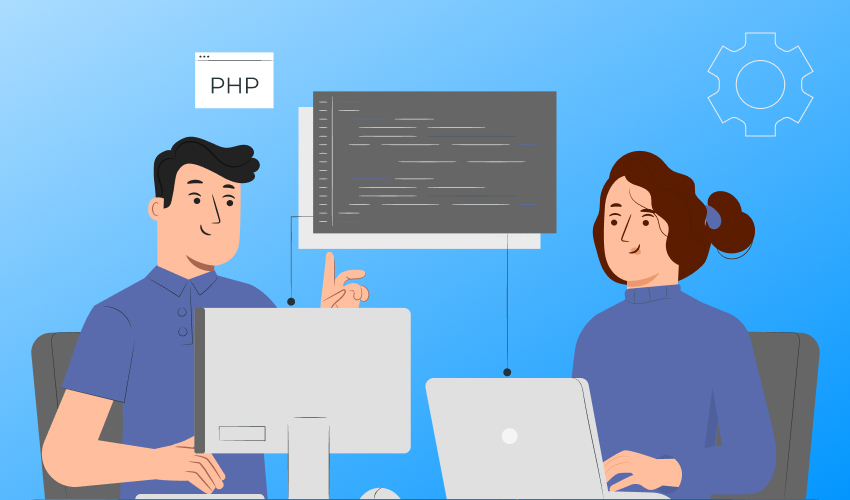Frameworks for PHP: 5 most relevant frameworks

PHP frameworks are programming platforms that make it easier and faster to create websites in the PHP programming language. They are presented as sets of tools and modules that allow programmers to easily create technological solutions. For example, they can be used to:
- routing configuration;
- manage databases;
- set up user authentication and authorization;
- protect the site from cyber threats.
Using PHP frameworks allows programmers to focus on the functionality of web applications, rather than being distracted by coding basic components from scratch.
What is PHP and why frameworks are needed
PHP (Hypertext Preprocessor) is a scripting language used to write the server side of web applications. It can be easily embedded in HTML code, allowing you to develop dynamic pages that load and update quickly.
The advantage of PHP frameworks is that they significantly expand programming capabilities by offering built-in modules and libraries. It is also worth highlighting points such as:
- clean and logical code that allows you to get rid of chaotic structure, which is important for large projects;
- established coding and website organization standards that improve code consistency and quality;
- successful teamwork, as each developer has a good understanding of the code structure, which reduces the time it takes to make sense of it;
- sets of generic libraries and tools that allow you to use proven solutions and implement functionality faster;
- support for a modular structure that makes it easy to add new components or modify existing ones, making it easier to scale.
PHP frameworks have disadvantages as well. Among them are slower processing of simple tasks compared to pure PHP. They require more memory and CPU resources because of the convenient but resource-intensive tools, which slows down performance on weak servers and increases hosting costs.
In addition, PHP frameworks offer a specific structure and programming approach, and this limits the flexibility to create unique products.
The most popular PHP frameworks
An overview of popular PHP frameworks includes:
- Laravel;
- Yii 2;
- Symfony;
- Phalcon;
- Slim.
PHP-frameworks have their own peculiarities, taking into account which MEGASITE programmers use them in their projects.

Laravel
If we talk about what are the best frameworks for PHP, we cannot fail to mention Laravel, which combines convenience, security and scalability. The framework is ideal for creating such complex projects as corporate websites, CRM-systems, online stores.
Among the advantages of Laravel are worth highlighting:
- MVC architecture that divides the website logic into 3 parts (model, view and controller) to improve readability and simplify code maintenance;
- user-friendly tools for working with databases;
- powerful routing for easy URL management;
- built-in Blade templating engine to simplify the creation of dynamic pages;
- various solutions against cyber threats - SQL injection, cross-site scripting (XSS), request forgery (CSRF);
- Laravel Artisan - one of the command line components with useful commands to speed up programming, e.g. development of controllers, models and migrations;
- optimized handling of resource-intensive algorithms through background processing and asynchronous queues.
Yii 2
Yii PHP framework is perfect for projects of any complexity, from business card sites to corporate portals. It is known for its ease of use, the ability to easily scale applications. Due to its fast loading time, it is considered one of the most productive PHP frameworks.
Among the key features:
- advanced tools for creating high-quality interfaces;
- support for Gii, a powerful code generator that helps you quickly create models, controllers and views, which simplifies and speeds up development;
- easily customizable templates;
- jQuery integration, which makes it easy to work in teams and with third-party developers;
- command line interface that allows you to quickly generate frequently used code snippets;
- allows you to easily structure your codebase;
- contains a large number of Ajax widgets for data validation;
- provides good scalability of web applications and compatibility with interfaces of other developers.
On the downside, the Yii framework is difficult for novice programmers, as any error seriously affects the website.
Symphony
A stable and reliable PHP framework. It is flexible, scales well, and is suitable for large projects, as they can be prepared for expansion at the initial stage.
Among the advantages of Symfony are worth highlighting:
- the only framework that fully meets the requirements and design patterns of PHP;
- convenient tools for scaling;
- integration with popular CMS and services;
- support for different databases;
- advanced routing for fast processing of HTTP requests;
- a wide range of solutions for API, authentication, form creation.
The framework itself is quite complex, has high requirements for programmers' qualification, but it is compensated by great functionality and flexibility.
Phalcon
One of the most productive PHP frameworks, as it works quickly due to the fact that it does not require large server resources. Among the features should be highlighted:
- created in C language, the third version above uses Zephir;
- works with Windows, Linux, Mac;
- compatible with MVC architecture;
- powerful ORM that supports multiple databases and makes it easy to work with them;
- offers convenient tools for session handling, form data validation, caching and other standard tasks.
Phalcon is a great option for projects where query processing speed and high performance are important. Flexible components and libraries allow you to customize it for specific tasks while maintaining the lightweight nature of a web application.
Slim
Suitable for small projects where the use of such costly frameworks is not required. Among the advantages of Slim:
- flexible link management through a built-in Dependency Injection container;
- support of middleware for processing HTTP requests and responses;
- connection of third-party libraries and components via Composer.
Slim is very lightweight as it contains minimal code and basic functions. This allows programmers to significantly speed up work on websites with uncomplicated functionality.
What to look for when choosing a framework?
When choosing a PHP framework, you should consider such things as:
- the purpose of the project and its scope;
- which tools are needed and which ones you can do without;
- the performance of the framework;
- flexibility and scalability of the project;
- security solutions;
- compatibility with the required infrastructure.
To learn more about the advantages of PHP frameworks and which ones are best to use in your project, contact MEGASITE IT-company. We have been creating websites for more than 10 years, so we will choose the optimal solution and help you effectively realize all tasks.
Your project
Call/write:


